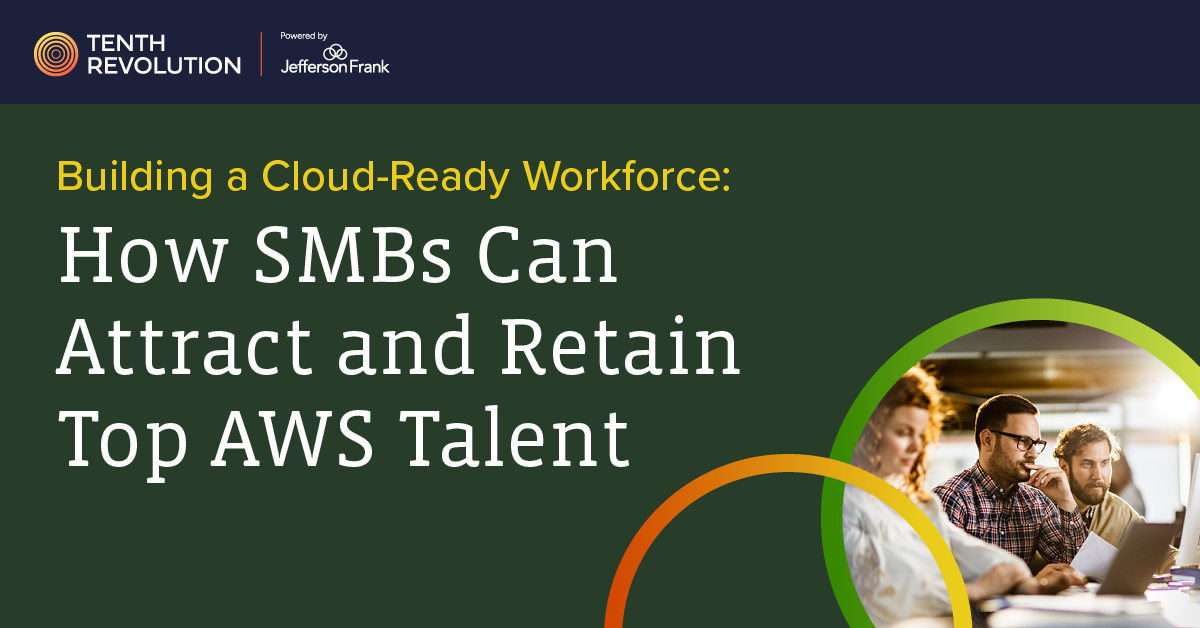
The competition for skilled AWS professionals has never been fiercer.
Tech giants offer six-figure salaries, luxury perks, and prestigious brand names that seem impossible for small and medium-sized businesses to match. Yet many SMBs are successfully building world-class cloud teams by focusing on what they can offer that large enterprises often can’t: flexibility, meaningful work, and genuine career growth opportunities.
The secret lies in understanding what today’s AWS professionals truly value beyond compensation. While salary remains important, modern cloud professionals increasingly prioritize work-life balance, learning opportunities, and the chance to make a real impact. SMBs that recognize this shift can turn their size from a disadvantage into a competitive advantage.
Understanding the Modern AWS Professional
Today’s AWS talent market looks dramatically different than it did five years ago. Remote work has expanded the talent pool globally, while professionals have become more selective about company culture and growth opportunities. The most skilled AWS professionals often have multiple job offers and can afford to be choosy about their next role.
Research shows that 73% of technology professionals consider flexible work arrangements more important than base salary when evaluating job opportunities. This shift creates an opening for SMBs that can move quickly and offer personalized employment packages.
AWS professionals today typically fall into three categories: career changers seeking cloud skills, experienced enterprise professionals wanting more autonomy, and digital natives who prioritize innovation over corporate prestige. Each group has different motivations, but all value companies that invest in their professional development.
Creating Competitive Compensation Packages
While SMBs may not match enterprise salaries dollar-for-dollar, they can create compensation packages that provide equal or greater value through creativity and flexibility.
Equity participation gives employees ownership stakes that could prove more valuable than higher salaries at established companies. A marketing automation startup increased their offer acceptance rate by 40% by offering equity packages that potentially outweighed the salary differences with larger competitors.
Performance-based bonuses tied to specific AWS implementations or cost savings provide opportunities for above-market earnings. Structure these bonuses around measurable outcomes like infrastructure cost reductions, deployment speed improvements, or system reliability metrics.
Consider offering AWS certification bonuses and training allowances. Many SMBs provide $2,000-5,000 annually for professional development, including conference attendance, certification exams, and training courses. This investment signals commitment to employee growth while building valuable skills.
Flexible benefit packages often appeal more than rigid corporate programs. Allow employees to choose between additional vacation time, home office stipends, childcare support, or health insurance upgrades based on their personal priorities.
Leveraging Flexibility as Your Superweapon
Large enterprises struggle with bureaucracy and rigid policies that frustrate talented professionals. SMBs can move quickly and adapt to individual needs, creating work environments that large companies simply cannot match.
Remote-first policies attract top talent regardless of geographic location. A financial services SMB hired a senior AWS architect from Silicon Valley by offering fully remote work, eliminating the candidate’s commute and reducing their living costs significantly.
Flexible scheduling accommodates different working styles and personal commitments. Many AWS professionals prefer non-traditional hours for focused work, especially when collaborating across time zones or managing global infrastructure.
Project-based work arrangements appeal to professionals who want variety and challenge. Structure roles around specific AWS implementations or migrations rather than rigid job descriptions, allowing talented individuals to tackle diverse problems.
Rapid decision-making processes demonstrate respect for employees’ time and input. While enterprises might take months to approve new tools or approaches, SMBs can implement employee suggestions within days or weeks.
Building Learning and Development Programs
Continuous learning isn’t just important for AWS professionals—it’s essential for staying current in a rapidly evolving field. SMBs can create compelling development programs without massive training budgets.
Partner directly with AWS for training resources and certification paths. AWS provides extensive free training through AWS Skill Builder, and many local AWS User Groups offer networking and learning opportunities that cost nothing to attend.
Create internal knowledge-sharing programs where team members teach each other new AWS services or techniques. A software development company instituted “AWS Fridays” where team members presented new services or implementation strategies, building collective knowledge while recognizing individual expertise.
Encourage conference attendance and industry participation. Send team members to re:Invent, local AWS events, or specialized conferences. The networking opportunities and cutting-edge knowledge gained often justify the investment through improved performance and employee retention.
Implement hands-on learning projects using AWS credits and sandbox environments. Allow team members to experiment with new services on internal projects or proof-of-concept implementations. This practical experience proves more valuable than theoretical training alone.
Establish mentorship relationships between senior and junior team members. Pairing experienced AWS professionals with newer team members accelerates skill development while creating internal leadership opportunities.
Creating a Culture of Innovation
Top AWS professionals want to work on challenging problems and implement cutting-edge solutions. SMBs can offer innovation opportunities that large enterprises often stifle through layers of approval and risk aversion.
Embrace a “fail fast, learn faster” mentality that encourages experimentation. Allow team members to try new AWS services or architectural approaches on non-critical projects, accepting that some experiments won’t succeed but learning from each attempt.
Give team members ownership over technical decisions within their areas of expertise. Rather than dictating specific implementation approaches, provide business requirements and let AWS professionals choose the best technical solutions.
Encourage contributions to open-source projects and technical communities. Support team members who want to speak at conferences, write technical blog posts, or contribute to AWS-related open-source projects. This visibility benefits both the individual’s career and your company’s reputation.
Create cross-functional teams where AWS professionals collaborate directly with business stakeholders. This exposure to business challenges helps technical team members understand the impact of their work while developing broader professional skills.
Sourcing Strategies That Work for SMBs
Traditional recruiting methods often favor larger companies with bigger budgets and established recruitment teams. SMBs need creative approaches to identify and attract top AWS talent.
Leverage your existing network and encourage employee referrals. Your current team members likely know other skilled AWS professionals who might be interested in new opportunities. Referral bonuses of $2,000-5,000 often prove more cost-effective than recruiting fees.
Participate actively in AWS community events and meetups. Local AWS User Groups provide excellent networking opportunities where you can meet professionals in informal settings. Many successful hires begin with casual conversations at community events.
Partner with coding bootcamps and certification programs that focus on cloud technologies. These partnerships provide access to motivated professionals who are actively building AWS skills and seeking career opportunities.
Use social media and professional networks strategically. LinkedIn, Twitter, and GitHub allow you to identify professionals with relevant AWS experience and engage with them around technical topics before discussing job opportunities.
Consider contract-to-hire arrangements that allow both parties to evaluate fit before making permanent commitments. Many AWS professionals prefer this approach as it reduces risk while providing insight into company culture and work environment.
Retention Strategies That Keep Top Talent
Attracting AWS talent is only half the battle—retention requires ongoing attention to employee satisfaction and career development.
Provide clear career progression paths that outline how AWS professionals can advance within your organization. Even small companies can define senior roles, technical leadership positions, or paths into management that give employees growth targets.
Offer increasing responsibility and autonomy as team members demonstrate competence. Top performers should receive opportunities to lead projects, mentor others, or represent the company at industry events.
Maintain competitive compensation through regular market reviews and adjustment cycles. Stay informed about industry salary trends and adjust compensation proactively rather than reactively when employees threaten to leave.
Create technical challenges that keep work interesting and engaging. Rotate team members through different projects, encourage exploration of new AWS services, and provide opportunities to solve diverse business problems.
Recognize and celebrate achievements publicly. Highlight successful AWS implementations, cost savings achieved, or innovative solutions developed by team members. Recognition within the broader AWS community through conference presentations or technical publications provides additional career benefits.
Measuring Your Success
Track key metrics that indicate the health of your AWS talent acquisition and retention efforts. Time-to-hire for AWS roles, offer acceptance rates, employee retention rates, and internal promotion rates provide insight into the effectiveness of your strategies.
Survey employees regularly about job satisfaction, career development opportunities, and workplace culture. Anonymous feedback helps identify issues before they lead to turnover while highlighting successful initiatives to expand.
Monitor industry trends and adjust your approach based on changing market conditions. The AWS talent market evolves rapidly, and strategies that work today may need modification as conditions change.
Building a cloud-ready workforce requires strategic thinking, creative problem-solving, and genuine commitment to employee development. SMBs that focus on their unique advantages while addressing the core needs of AWS professionals can compete successfully with much larger organizations.
The key lies in recognizing that today’s top AWS talent values flexibility, learning opportunities, and meaningful work as much as compensation. Companies that provide these elements, combined with competitive packages and growth opportunities, will build strong teams regardless of their size.
Your success in building a cloud-ready workforce isn’t determined by your budget—it’s determined by your commitment to creating an environment where AWS professionals can thrive, grow, and make meaningful contributions to your business success.



